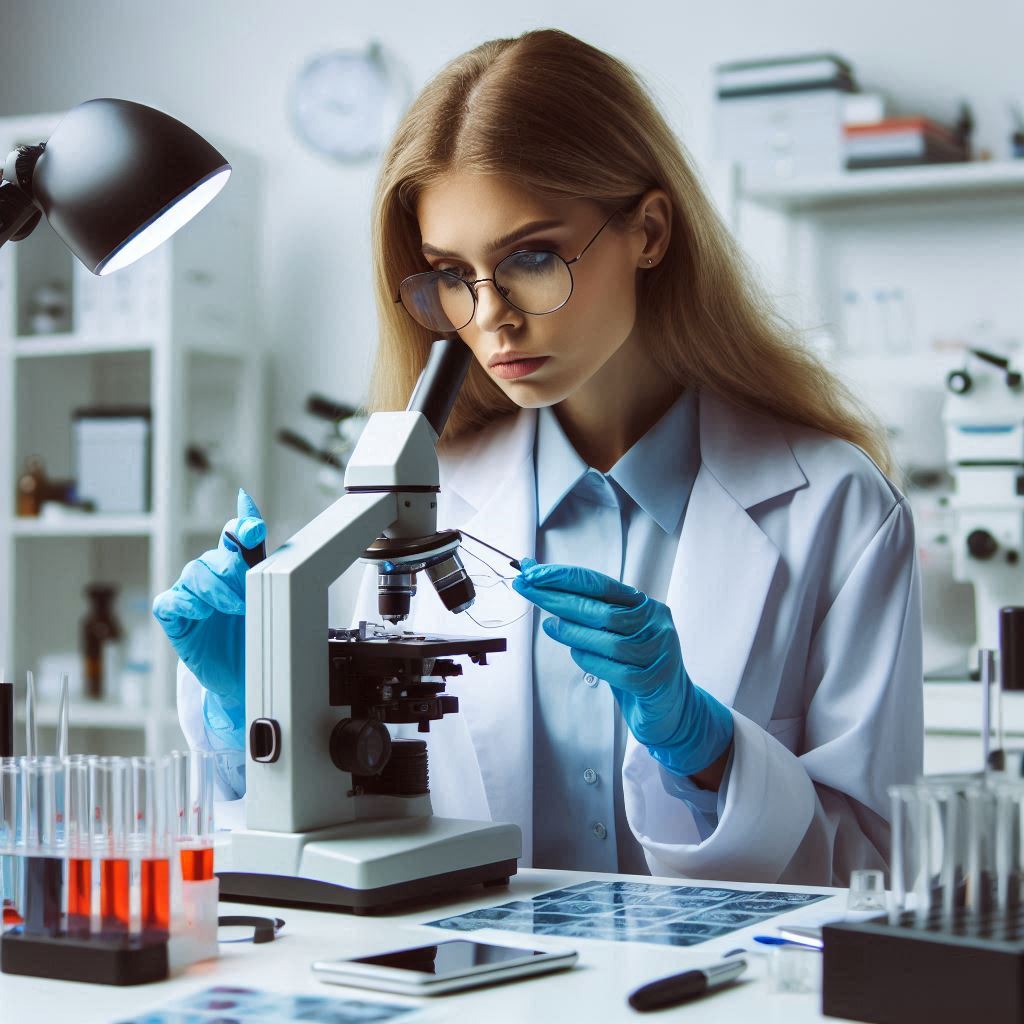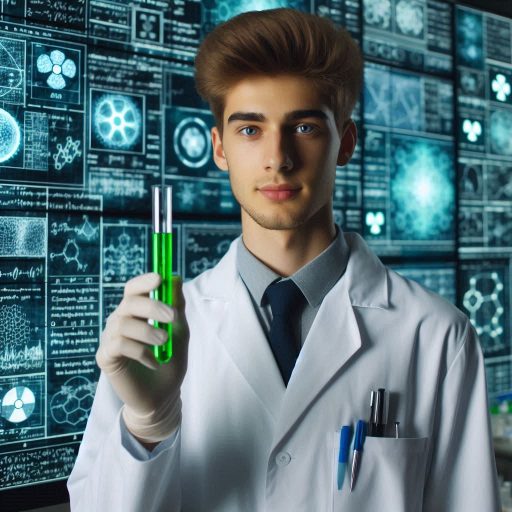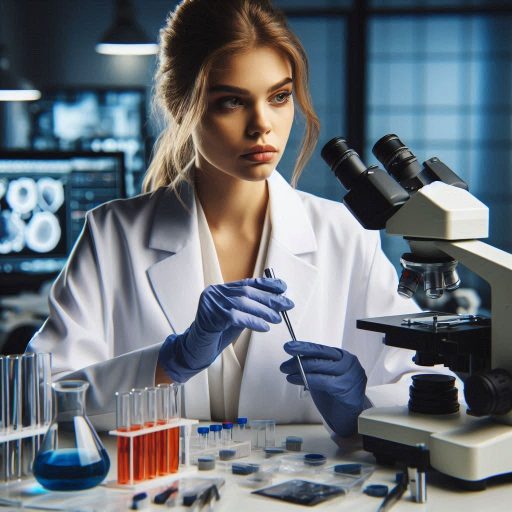Introduction
A forensic scientist plays a crucial role in criminal investigations by meticulously analyzing physical evidence.
Their work encompasses various tasks, including collecting samples from crime scenes, conducting laboratory tests, and interpreting complex results.
Forensic scientists examine a wide range of evidence, from fingerprints and bloodstains to digital data and toxic substances.
Each type of evidence provides unique insights that can help reconstruct events and establish timelines surrounding a crime.
The importance of forensic science in solving crimes cannot be overstated.
Forensic scientists provide objective and scientific analysis that can link suspects to criminal activity.
Their findings often serve as key evidence in court, influencing juries and judges alike.
By transforming raw data into clear, understandable results, forensic scientists ensure that investigations remain grounded in factual evidence rather than assumptions or biases.
Their contributions extend beyond mere analysis; forensic scientists play a vital role in upholding the integrity of the justice system.
By adhering to strict protocols and maintaining high standards of quality, they help ensure that the evidence presented in court is reliable and trustworthy.
Their expertise is often sought during trials, where they may be called to testify as expert witnesses, explaining the significance of their findings to the court.
Educational background and training required to become a forensic scientist
Bachelor’s Degree in Forensic Science, Chemistry, Biology, or Related Field
A bachelor‘s degree in forensic science or a related field is essential.
This educational background equips students with knowledge in chemistry and biology.
Students learn to analyze physical evidence, such as fingerprints and DNA.
Courses in criminal justice also provide context for forensic applications.
Strong analytical skills develop through rigorous scientific training, preparing graduates for real-world challenges.
Additional Certification or Training in Specific Areas of Forensic Science
Beyond a bachelor’s degree, many forensic scientists pursue additional certification.
Certifications demonstrate expertise in specific areas of forensic science.
For instance, the American Board of Criminalistics offers various certifications.
These credentials can enhance job prospects and credibility in the field.
Forensic scientists may specialize in areas such as DNA analysis, toxicology, or ballistics.
Each specialty requires unique knowledge and skills.
By obtaining certifications, forensic scientists validate their proficiency in these areas.
Continuing education is essential for staying updated on industry advancements.
Hands-On Experience Through Internships or Work in Crime Labs
Hands-on experience is vital for aspiring forensic scientists.
Many students seek internships during their degree programs.
These internships provide valuable exposure to real-world forensic work.
They often involve assisting in crime labs and observing experienced professionals.
Interns learn about evidence collection, preservation, and analysis.
Working in a crime lab allows aspiring forensic scientists to apply their classroom knowledge.
They gain practical skills, such as using laboratory equipment and analyzing samples.
This experience helps them understand the workflow and protocols involved in forensic investigations.
After graduation, many forensic scientists start their careers in entry-level positions.
These positions often include roles as laboratory technicians or crime scene analysts.
Early career experiences provide further opportunities for learning and growth.
Forensic scientists work closely with law enforcement and legal teams, enhancing their understanding of the field.
A typical day might include analyzing evidence, conducting experiments, and documenting findings.
Forensic scientists must maintain meticulous records of their work.
Attention to detail is crucial, as their findings often play a pivotal role in legal cases.
Read: Botany Career Fairs and Networking Events
Typical work environment and daily tasks of a forensic scientist
Working in a Crime Lab or at Crime Scenes
Forensic scientists often start their day in a crime lab.
They may arrive early to review case files and prioritize tasks.
Some days require traveling to crime scenes for evidence collection.
At these scenes, they must quickly assess the situation.
Ensuring the integrity of the evidence is crucial.
Crime scenes can be chaotic and time-sensitive.
Forensic scientists wear protective gear to prevent contamination.
They meticulously document everything they observe.
This documentation helps recreate the events surrounding a crime.
Taking photographs and sketching the scene is standard practice.
Once they collect evidence, they return to the lab for analysis.
They may examine items like weapons, clothing, or trace evidence.
Each piece of evidence tells a story that helps build a case.
Analyzing Evidence Such as DNA, Fingerprints, and Blood Spatter
In the lab, forensic scientists analyze various types of evidence.
They often work with DNA samples to identify suspects.
This analysis involves advanced techniques like Polymerase Chain Reaction (PCR).
Forensic scientists must be skilled in using specialized equipment.
Fingerprint analysis is another essential task.
They use techniques like dusting for prints and chemical development.
Comparing fingerprints helps link suspects to crime scenes.
Forensic scientists need a keen eye for detail to identify unique patterns.
Blood spatter analysis is a complex aspect of their work.
Forensic scientists examine the size, shape, and distribution of blood droplets.
This analysis reveals important information about the events that occurred.
They must understand the physics of blood spatter to make accurate interpretations.
Documenting Findings and Presenting Evidence in Court as Expert Witnesses
Once forensic scientists complete their analyses, they document their findings.
They prepare detailed reports outlining their methods and results.
This documentation is vital for law enforcement and legal proceedings.
Forensic scientists often present their findings in court as expert witnesses.
In court, they explain complex scientific concepts in understandable terms.
They may face scrutiny from attorneys during cross-examinations.
Their ability to communicate clearly impacts the outcome of a case.
Testifying in court can be nerve-wracking, but it is rewarding.
Forensic scientists play a crucial role in the justice system.
Their work helps ensure that justice is served.
They strive to provide accurate and unbiased analyses to support investigations.
Therefore, a day in the life of a forensic scientist involves diverse tasks.
From working in crime labs to analyzing evidence, their work is crucial.
They document findings and present evidence in court.
This career requires dedication, attention to detail, and a passion for justice.
Forensic scientists are vital in solving crimes and making communities safer.
Read: Preparing for a Botany PhD: Tips and Advice
Tools and technologies used by forensic scientists
Microscopes for Analyzing Trace Evidence
Microscopes are vital for analyzing trace evidence.
Forensic scientists use them to examine hair, fibers, and other small materials.
These tools allow them to identify and compare evidence collected from crime scenes.
High-powered microscopes provide detailed images of samples.
Forensic scientists can spot even the smallest differences.
They meticulously document their findings to build a solid case.
The analysis of trace evidence often leads to crucial breakthroughs.
This evidence can link a suspect to a crime scene or victim.
DNA Sequencing Machines for Genetic Analysis
DNA sequencing machines have revolutionized forensic science.
Forensic scientists utilize these machines to analyze genetic material.
They extract DNA from various sources, including blood, saliva, and hair.
The sequencing process reveals unique genetic profiles.
These profiles help identify individuals and establish connections to crime scenes.
By comparing DNA samples from victims and suspects, forensic scientists can draw meaningful conclusions.
This analysis is often a turning point in investigations.
Accurate DNA analysis can provide definitive evidence in court.
Digital Forensics Tools for Analyzing Electronic Devices
Digital forensics tools are essential in today‘s technology-driven world.
Forensic scientists use these tools to analyze electronic devices, such as computers and smartphones.
They extract data, recover deleted files, and investigate online activities.
This analysis helps uncover evidence related to cybercrimes and other offenses.
Forensic experts utilize specialized software to navigate through complex data structures.
They must be meticulous to ensure data integrity during the process.
Digital evidence can provide insights that traditional methods may miss.
This aspect of forensic science is increasingly vital in modern investigations.
Chemical Analysis Equipment for Identifying Substances
Chemical analysis equipment is fundamental for identifying various substances.
Forensic scientists use techniques like gas chromatography and mass spectrometry.
These methods allow them to analyze drugs, toxins, and other materials.
They can determine the composition and concentration of substances present.
This analysis is crucial in cases involving illegal drugs or poisoning.
By identifying substances, forensic scientists contribute valuable information to investigations.
They often collaborate with law enforcement to provide expert insight into toxicology reports.
In review, a forensic scientist‘s day is filled with using advanced tools and equipment.
Microscopes, DNA sequencing machines, digital forensics tools, and chemical analysis equipment are all essential.
Each piece of technology plays a significant role in solving crimes.
By utilizing these tools effectively, forensic scientists contribute to the justice system.
Their work helps ensure that the truth prevails and justice is served.
Read: Interdisciplinary Research: Botany and Other Sciences

Challenges Faced by Forensic Scientists
Handling Large Caseloads and Tight Deadlines
A day in the life of a forensic scientist often starts early.
These professionals face large caseloads and tight deadlines.
Each case requires meticulous attention to detail.
Forensic scientists prioritize their tasks based on urgency.
They often work under pressure to meet law enforcement demands.
Time management skills are essential for success in this field.
Many forensic scientists use digital tools to stay organized.
These tools help track evidence and case progress efficiently.
Regularly updating their case files ensures they meet deadlines.
They communicate frequently with law enforcement agencies.
This collaboration ensures a streamlined investigation process.
When cases pile up, the pressure can increase.
Forensic scientists must remain focused despite distractions.
They learn to balance multiple tasks without sacrificing quality.
Each analysis requires thorough documentation.
This meticulous approach maintains the integrity of the evidence.
Maintaining Accuracy and Integrity of Evidence
Accuracy is crucial in forensic science.
Forensic scientists must adhere to strict protocols.
They ensure that all evidence is collected, stored, and analyzed correctly.
Any mistakes can compromise an entire investigation.
Therefore, they double-check their findings to ensure reliability.
They maintain detailed records of every step in the process.
Forensic scientists often conduct peer reviews.
This practice helps catch potential errors before they escalate.
Colleagues provide valuable feedback, enhancing the quality of their work.
They attend regular training sessions to stay updated on best practices.
Ongoing education reinforces their commitment to accuracy and integrity.
In addition, forensic scientists use advanced technology for analyses.
This technology enhances precision and reduces human error.
They must be familiar with the latest tools and techniques.
Mastering these technologies helps ensure that their results are trustworthy.
Dealing with the Emotional Toll of Working on Violent or Disturbing Cases
Working on violent or disturbing cases takes an emotional toll.
Forensic scientists often encounter graphic evidence.
This exposure can lead to emotional fatigue over time.
They must develop coping mechanisms to manage their feelings.
Many professionals seek support from colleagues and mental health resources.
Maintaining a healthy work-life balance is essential.
Forensic scientists engage in activities outside of work to decompress.
Hobbies, exercise, and time with family help relieve stress.
This balance allows them to return to work with renewed focus.
Additionally, sharing experiences with peers can provide relief.
Discussing challenging cases fosters a sense of camaraderie.
It reassures forensic scientists that they are not alone in their struggles.
This support system helps them navigate the emotional challenges of their profession.
Generally, a day in the life of a forensic scientist is demanding yet rewarding.
Handling large caseloads and tight deadlines tests their skills.
Maintaining accuracy and integrity ensures reliable evidence.
Despite the emotional toll of disturbing cases, professionals find fulfillment in their work.
They contribute to justice and public safety through their expertise.
This dedication makes a difference in the lives of victims and their families.
Read: Women in Botany: Celebrating Pioneers and Leaders
Delve into the Subject: Impact of Nuclear Science on Society
Importance of collaboration with other professionals in the criminal justice system
Working Closely with Law Enforcement Officers to Gather Evidence
A forensic scientist’s day often begins with collaboration.
Early in the morning, they may receive a call from law enforcement.
Officers may request assistance in a new case.
Forensic scientists quickly respond to gather crucial evidence.
They arrive at crime scenes equipped with specialized tools.
At the scene, they assess the environment for potential evidence.
Every detail can be critical in solving a case.
Forensic scientists document everything meticulously.
They take photographs and collect samples carefully.
This process ensures that evidence remains uncontaminated and usable in court.
Forensic scientists work alongside detectives and officers.
This teamwork enhances the investigation’s efficiency and accuracy.
They discuss findings and share insights to guide evidence collection.
Law enforcement relies on forensic scientists’ expertise to interpret complex data.
This collaboration is vital for building strong cases.
Transform Your Career Today
Unlock a personalized career strategy that drives real results. Get tailored advice and a roadmap designed just for you.
Start NowConsulting with Attorneys and Prosecutors on Cases
After gathering evidence, forensic scientists shift their focus.
They often consult with attorneys and prosecutors.
These discussions are essential for understanding the legal context of a case.
Forensic scientists explain their findings and methodologies in layman’s terms.
This communication helps attorneys prepare for court proceedings.
During these consultations, forensic scientists provide insights on evidence relevance.
They clarify how specific findings can support a case.
Attorneys rely on this expertise to develop legal strategies.
Forensic scientists also prepare reports summarizing their analyses.
These documents serve as key evidence during trials.
In some instances, forensic scientists may recommend further testing.
They identify areas that require additional analysis to strengthen the case.
This proactive approach helps ensure all evidence is thoroughly examined.
Testifying in Court and Explaining Findings to Juries
Testifying in court is a significant responsibility for forensic scientists.
They must present their findings clearly and confidently.
Before entering the courtroom, they review case details thoroughly.
This preparation ensures they can answer challenging questions from attorneys.
When testifying, forensic scientists explain complex concepts to juries.
They must break down technical jargon into understandable language.
Effective communication is crucial for helping jurors grasp the evidence’s importance.
Forensic scientists often use visual aids to illustrate key points.
These tools help juries visualize evidence, making it more relatable.
During cross-examination, forensic scientists must remain composed.
They answer questions from opposing counsel while defending their findings.
This process can be intense but is essential for the judicial system.
Their testimony can significantly impact a case’s outcome.
At the end of the day, forensic scientists reflect on their work.
Each case brings unique challenges and learning opportunities.
Collaborating with law enforcement, consulting with attorneys, and testifying in court shapes their daily experiences.
This multifaceted role emphasizes their vital contributions to the justice system.
Career opportunities and growth potential for forensic scientists
Specializing in Areas Such as Digital Forensics, DNA Analysis, or Forensic Anthropology
Digital forensics has grown significantly in recent years.
As technology evolves, so do the techniques to uncover digital evidence.
Forensic scientists in this field analyze electronic devices.
They recover deleted files and track online activities.
They often work closely with law enforcement to ensure data integrity and legal compliance.
The demand for experts in digital forensics is high, reflecting society’s increasing reliance on technology.
DNA analysis remains a cornerstone of forensic science.
It helps identify victims and perpetrators with high accuracy.
Forensic scientists extract DNA from various sources, such as blood or hair samples.
They analyze genetic markers to establish connections between individuals and crime scenes.
Specializing in DNA analysis can lead to significant advancements in criminal investigations and exonerations.
Forensic anthropology combines biology and anthropology to assist in criminal cases.
Professionals in this field analyze skeletal remains to determine identity, cause of death, and time since death.
They often work with law enforcement agencies and medical examiners.
Their findings can play a crucial role in solving cases involving unidentified remains.
This specialization requires extensive education in both biological and social sciences.
Advancing to Supervisory or Management Roles in Crime Labs
As forensic scientists gain experience, they may advance to supervisory or management roles in crime labs.
These positions involve overseeing laboratory operations, managing staff, and ensuring quality control.
Professionals in leadership roles develop policies and protocols to enhance laboratory efficiency.
They also facilitate training for new employees.
This progression allows experienced scientists to shape the future of forensic science.
Supervisors play a vital role in maintaining standards within the lab.
They ensure compliance with regulations and best practices.
Their leadership directly impacts the accuracy and reliability of forensic analysis.
Opportunities for Research and Academic Positions in Universities or Research Institutions
Career advancement opportunities also exist in research and academic positions.
Many forensic scientists transition into academia to educate the next generation of professionals.
They conduct research on emerging technologies and techniques in forensic science.
Universities and research institutions seek experts to lead innovative projects.
This path offers the chance to contribute to the field while shaping future practitioners.
In addition to teaching, academic positions often involve publishing research.
Sharing findings with the scientific community fosters collaboration and progress.
Conferences and workshops provide platforms for professionals to exchange ideas and explore new methods.
Overall, specializing in areas like digital forensics, DNA analysis, or forensic anthropology opens doors to various career paths.
As forensic scientists advance in their careers, they play pivotal roles in solving crimes, managing teams, and conducting impactful research.
These opportunities contribute to the ongoing evolution of forensic science, enhancing its role in the justice system.
Find Out More: Fieldwork Tips for Plant Science Students
Learn More: Challenges Faced by Immunologists Today
Discover More: Biostatistics: Impact on Public Health Research
Gain More Insights: Marine Biology Graduate Programs Guide
Conclusion
A forensic scientist’s day is filled with essential responsibilities and unique challenges that significantly impact the justice system.
These professionals analyze evidence collected from crime scenes, ensuring accuracy and reliability in their findings.
Their tasks include examining fingerprints, DNA samples, ballistics, and various types of physical evidence, each requiring specialized knowledge and techniques.
Detailed documentation of findings is crucial for maintaining the integrity of investigations, as this information can be critical during trials.
Forensic scientists often collaborate with law enforcement and legal teams, providing expert insights that help shape investigations.
They must effectively communicate complex scientific concepts to non-experts, ensuring that their findings are understood.
This collaboration is vital, as it can lead to breakthroughs in cases that may otherwise go unsolved.
Despite these rewarding aspects, forensic scientists face various challenges, including tight deadlines, the pressure of high-stakes cases, and the emotional weight of their work.
They must navigate the intricacies of the legal system while ensuring their analysis meets rigorous standards.
The pressure to deliver accurate results can be intense, especially when a victim’s family seeks justice.
The role of forensic science in solving crimes is crucial.
[E-Books for Sale]
The Big Book of 500 High-Paying Jobs in America: Unlock Your Earning Potential
$19.99 • 500 High-Paying Jobs • 330 pages
Explore 500 high-paying jobs in America and learn how to boost your career, earn more, and achieve success!
See All 500 High-Paying Jobs of this E-Book
1001 Professions Without a Degree: High-Paying American Jobs You Can Start Now
$19.99 • 1001 Professions Without a Degree • 174 pages
Discover 1001 high-paying jobs without a degree! Unlock career tips, skills, and success strategies for just $19.99!




